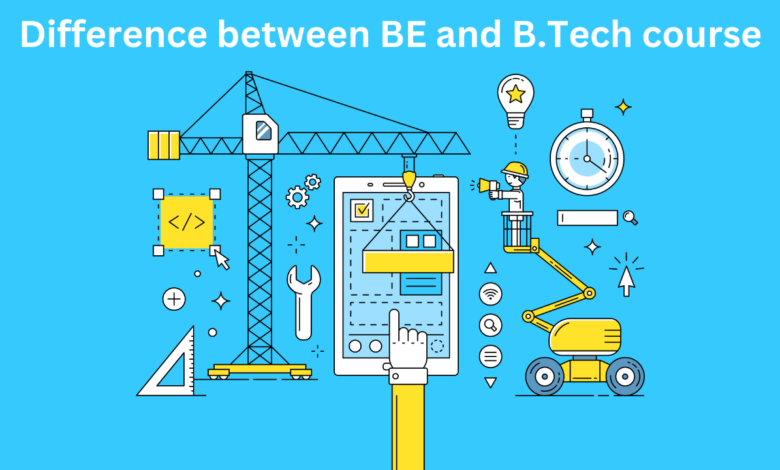Difference between BE and B.Tech Course

Engineering continues to be the most popular undergrad course in India, according to research (released by the National Council of Advanced Economic Research). Either a B.E. (Bachelor of Engineering) or a B.Tech (Bachelor of Technology) degree is offered by the several institutions that provide undergraduate programs. The distinction between the two degrees is one of the most frequently asked questions by those aspiring to become engineers. Is there a variation in the course curricula in addition to the names and nomenclature of the degrees?
Compared to the BE course, which is more theoretical, the B.Tech course is somewhat more practically focused. The distinction between the two degrees; engineering vs. technology; can be deduced from their names alone and is fairly slight. Technology deals more with the practical implementation of these theories, whereas engineering is more of a “science” that works with theoretical notions and principles. However, the curriculum for both B.E. & B.Tech programs at various engineering institutions and institutes are mostly the same. Employers are equally interested in both degrees. The repute of the engineering school where you received your B.E./B.Tech degree is highly important.
Difference in BE and B.Tech Course
A bachelor’s degree in engineering focuses on teaching students the knowledge and abilities required to carry out industrial tasks effectively and efficiently, as well as how to create systems, procedures, and equipment to enhance the effectiveness and efficiency of industrial activities.
A B.Tech undergraduate degree program offers all the knowledge and expertise needed to synchronise technologies. After graduating from a reputable B.Tech engineering college, this highly sought-after course leads to amazing employment chances. The majority of this course’s applicants are those who are thinking about pursuing a career in technology. The most obvious question that applicants have is which course they should take into consideration. B.E. (Bachelor of Engineering) and B.Tech (Bachelor of Technology) are two engineering degree programs that have little in common yet are significantly different from one another. In order to make it simpler for candidates to choose their desired stream and enroll in the appropriate B.Tech engineering college, we are attempting to highlight the distinctions between the two.
You can better grasp the differences and career options following the course by getting a brief introduction to these two fields. While the B.Tech course includes a lot of practical input, the B.E curriculum is more theoretical. Some claim that the differences between the two are negligible; but, if you take an engineering course in depth, you will learn that it covers the fundamental ideas and guiding principles that underlie all engineering disciplines. To comprehend how the ideas and principles will be used, one must understand the technology. Numerous engineering institutes offer the majority of engineering and technology-related courses at the undergraduate level. Most disciplines in colleges have a common syllabus, which is very important for creating a strong foundation for your future.
A bachelor’s in engineering requires 4 years and 8 separate semesters to complete. Depending on the type of degree a candidate wishes to pursue, a bachelor’s in technology is a course at the undergraduate level that lasts about five years.
| B.Tech (Bachelor of Technology) | BE (Bachelor of Engineering) |
|---|---|
| BTech is a skill-based course | BE is a knowledge-based course |
| Industrial visits and internships are compulsory for BTech | Industrial visits and internships are essential but not mandatory |
| More than the theoretical aspects, the main focus is on practical applications | The main focus is on understanding the fundamentals and gaining theoretical knowledge. |
| Since it is more skill-based and technology-oriented, the course is updated frequently | Since it is more knowledge-based, the course is not as frequently updated as the other |
| Most academic institutions that provide engineering courses typically refer to their degree as BTech. | Typically, universities that offer engineering also offer courses in the humanities, the arts, etc. |
Popular Courses are;
|
Popular Courses are;
|
These courses can lead to lucrative job prospects. Candidates with a B.E. may be hired by a variety of industries, including textile, medical, aerospace, electrical, financial, and information technology. The employment alternatives for a B. Tech are similarly rewarding and include options in fields including electrical engineering, surveying, cyber law, medical, textile, and information systems. The B.E. the program offers a variety of career options in fields like aerospace, medicine, textiles, electrical, computer science, finance, etc. the pay scale is 6.8 LPA on average. Depending on experience and skill level, it offers a good wage structure starting at roughly 6.2 LPA and going higher.
There are some misconceptions about the courses among the public. Some people believe that only government institutions offer B.Tech, while private institutions only give B.E. There are numerous government institutions that give a BE degree, while there are numerous private institutions that offer B.Tech degree programs, thus this is untrue. After the sixth semester, industrial training is required for these courses. Although B.E. and B.Tech. courses are appreciated, your performance at the end of all semesters and the college where you registered will be important in the future.
As was previously stated, there are a number of work opportunities available after completing both the B.E. and B.Tech degrees. Careers for students will soar after gaining some experience. Here are a few of the most sought-after positions.
- Mechanical Engineer
- Electronics Engineer
- Robotics Engineer
- Safety Engineer
- Materials Engineer
- Construction Engineer
- Control Engineer
- Ceramic Engineer
- Chemical Engineer
- Software Developer
- Software Engineer
- Design Engineer
- Civil Engineer
- Assistant Professor
- Automation Engineer
- Biotechnologist
Whether B.Tech CSE or B.Tech IT is the better option is not easily determined. Both programs have benefits and drawbacks. The B.Tech CSE program will be a better choice for you if you’re still unsure of which computer engineering concentration to pursue because it will cover a wide range of topics and provide you a better idea of how to set your higher education and professional goals.






